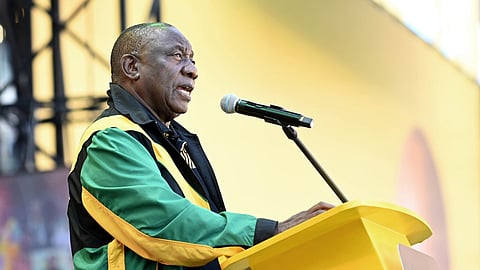South Africa's biggest labour union, COSATU, is urging the ANC to seek support from the opposition DA to retain power after losing its parliamentary majority. This would involve a supply-and-confidence agreement instead of a formal coalition, allowing the DA some parliamentary oversight roles. The ANC's executive committee will decide on the proposal.
Sign up for your early morning brew of the BizNews Insider to keep you up to speed with the content that matters. The newsletter will land in your inbox at 5:30am weekdays. Register here.
By Antony Sguazzin
South Africa's biggest labor union federation is pushing the African National Congress to consider seeking support from the main opposition party to enable it to stay in power after it was stripped of its parliamentary majority, a person familiar with the situation said.
The Congress of South African Trade Unions wants the ANC to explore the possibility of getting the centrist Democratic Alliance to back its choice of president and help it approve crucial votes under a so-called supply-and-confidence agreement, according to the person who asked not to be identified because they aren't authorized to comment. That would obviate the need for a formal coalition.
In return, the DA could be given positions within parliament to allow it to hold the executive body of government to account.
Such an arrangement, which would keep the two parties at arms length and could be undone, is preferable to them entering into a formal coalition — which is seen as a non-starter, the person said. Cosatu, which is usually opposed to any dealings with the DA and would favor a leftist alliance, is trying to be pragmatic given its concerns about other potential partners and the damage they could cause to both the ANC and the economy, they added.
The federation has been a close ANC ally since it took power three decades ago and plays a key role in its campaigning. Union leaders do have some influence on the ANC's thinking, but the party's leadership will ultimately determine its next move. The ANC's national executive committee is meeting Thursday to decide on a way forward.
The ANC won just 40.2% of votes cast on May 29, meaning it will have to partner with at least one of its three biggest rivals to extend its 30-year rule: the DA, the leftist Economic Freedom Fighters or former President Jacob Zuma's uMkhonto weSizwe Party, known as MKP.
The rand has weakened against the dollar since the election amid fears that the possible inclusion of populist parties in the new administration would give rise to policy uncertainty and property rights would be undermined.
Cosatu's leadership has yet to pronounce on its official position on the talks, and its openness to some sort of arrangement with the DA comes as a surprise because it has accused the party of representing the interests of the White minority and big business. The DA has consistently voted against legislation to protect workers and named a six-person team to negotiate the composition of the next administration, four of whom are White.
Any tie-up will be a tough sell to Cosatu's affiliates and their 1.8 million members. Cosatu's Secretary-General Solly Phetoe told the South African Broadcasting Corp. on Thursday that the ANC should avoid a coalition with the DA because of its stance on labor rights.
EFF leaders have been caught up in corruption scandals, attacked President Cyril Ramaphosa in parliament and threatened to destroy the ANC, giving union leaders cause for concern, the person said.
There is no appetite among the ANC or its union allies to work with the breakaway MKP, which cost it a substantial number of votes and is primarily responsible for the current predicament it find itself in, they said. There are also concerns about the integrity of the party's leaders, they added.
Bloomberg Terminal clients can click on ELEC ZA for more on South Africa's elections
The ANC, which led the fight against apartheid before taking power under Nelson Mandela in 1994, has said that it favors the formation of a government of national unity that would include all of its main rivals, but it faces an uphill battle in getting them to participate.
DA leader John Steenhuisen has said he's open to a deal, but won't work with either the EFF or MKP, while Zuma's party has said it will only cooperate with the ANC if Ramaphosa is replaced — a demand that's been flatly rejected. On Wednesday, the ANC said its approaches to the MKP had been ignored.
There are wide-ranging views within the ANC about the preferred makeup of the next administration, and the party is likely to be divided no matter who is included, with talks expected to drag on, the person said. There are also divisions among DA negotiators over how a tie-up should work, with some favoring a government of nation unity and others a less formal working arrangement, they said.
While there are some DA officials that Cosatu can work with, the party's oppositional stance toward Black economic empowerment is problematic, especially since so many of its top leaders are White, the person said.
The DA's antipathy toward the government's plans to implement universal national health insurance is also an issue, since most people don't have medical insurance and many of those who do consider it to be unaffordable and want workable alternatives to be made available, they said.
Read also:
© 2024 Bloomberg L.P.

